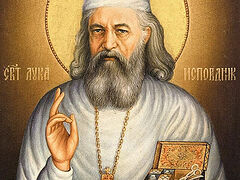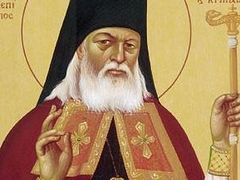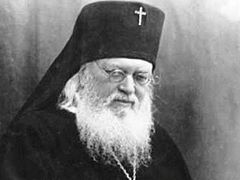Christ is Risen, My Dear Readers!
 “I am a scalpel in God’s hands,” Saint Luke once said about himself. Indeed, he excised from the Body of God’s Church all that was impure, sinful, and heretical, anything that tried to parasitize upon It. Bishop Luke was not like St. Seraphim of Sarov. He was different, with a complex and difficult character—sometimes too sharp and demanding, sometimes overly rigorous and strict. He was a demanding bishop who required full dedication from the clergy and did not bow to the authorities.
“I am a scalpel in God’s hands,” Saint Luke once said about himself. Indeed, he excised from the Body of God’s Church all that was impure, sinful, and heretical, anything that tried to parasitize upon It. Bishop Luke was not like St. Seraphim of Sarov. He was different, with a complex and difficult character—sometimes too sharp and demanding, sometimes overly rigorous and strict. He was a demanding bishop who required full dedication from the clergy and did not bow to the authorities.
But God glorified Bishop Luke with great glory, fame, and honor.
St. Luke’s character was shaped by his challenging and arduous life. From childhood, Valentin (his baptismal name) wanted to become an artist, but the poverty of ordinary people and the harshness of their lives forced him to make a different choice. Valentin became a doctor. He worked in rural districts for fifteen hours a day. No one cared whether he ate, slept, or rested. As the sole doctor for thirty thousand people, he had to be an obstetrician, pediatrician, ophthalmologist, surgeon, and more.
How different is the attitude of some towards their profession today! Often, people choose fields that promise the highest income. Initially, the foundation of this work is profit and calculation, not the desire to help those in need. Today, few choose a life of sacrificial service to others.
After his wife’s death, Valentin was left with four children, the eldest of whom was twelve and the youngest six. Nevertheless, Valentin received ordination, knowing that persecution would follow. And it did. The rest of St. Luke’s life was the carrying of a heavy cross as a bishop, a doctor, and a confessor. For this courageous and steadfast confession of the Christian faith, God granted St. Luke bright heavenly crowns, the radiance of which we see in the many miracles and healings that occur through prayers to this saint.
The Fear of God and Human Cowardice
As we honor the memory of one of the most renowned saints of modern times, St. Luke of Crimea, we often set before ourselves the example of his courage and heroism in confessing his faith in God. The name of Saint Luke is known to millions of believers around the world. Yet, no one remembers the names of the “Renovationists” who, in the same era, chose to cooperate with the godless Bolshevik regime. What led to such betrayal? Cowardice. At the heart of cowardice lies selfishness and self-centeredness. A coward is someone who places their own interests above God and all that is holy. They are always ready to betray for the sake of personal gain.
But why is cowardice so dangerous from a spiritual perspective? If we are born into this world, we must eventually depart from it. Our life will inevitably come to an end. For a coward, however, the most important thing is to preserve his life. Comfort becomes the meaning of his existence. He fears any risk that might lead to death or diminish the quality of his life. Yet, risky situations are given to us by God to foster changes and development within our soul.
The soul of a coward is like stagnant water. It gradually starts to decay and emit a foul odor, turning into a swamp. Pure water doesn’t stay still; it constantly flows. Similarly, the soul, while it is in the body, is called to change, to flow according to God’s providence. Sometimes it must plunge down a waterfall from great heights; at other times, it makes sharp turns. There is considerable risk in all this. Such a soul is always dynamic and evolving. A coward does not want to live this way; he seeks stability and peace. And if the price for that is betrayal, he is willing to pay it. The apostle John the Theologian says that the cowardly will have their part in the lake that burns with fire and brimstone (Rev. 21:8).
There is only one fear that contributes to the growth of the soul—the fear of God. From this fear comes repentance, leading a person to humility and salvation. St. Luke of Crimea possessed the fear of God and a courageous, brave soul. He never compromised with his conscience. Therefore, the memory of this righteous man will forever remain in the hearts and souls of Orthodox Christians.



